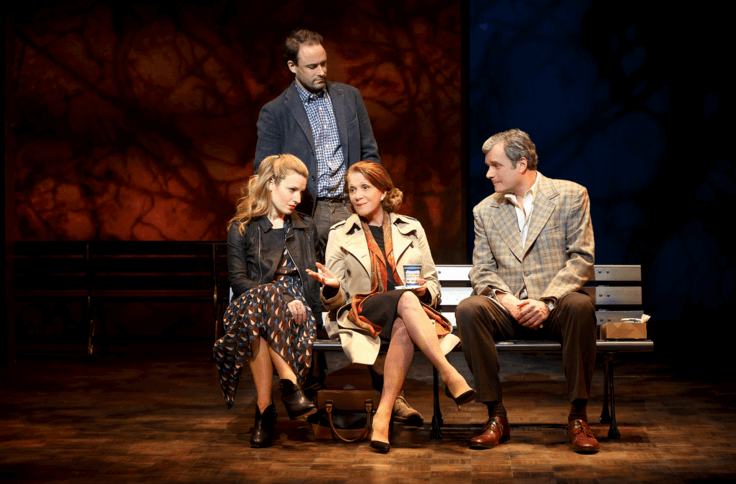Necessary Fictions: Our Mother’s Brief Affair

Our Mother’s Brief Affair
photo by Joan Marcus
Our Mother’s Brief Affair
MTC’s Samuel J. Friedman Theatre
261 W. 47th Street
“She was nostalgic but not for anything that had ever happened.” So says Seth (Greg Keller) as he describes his mother Anna (Linda Lavin) in the first scene of Richard Greenberg’s deft and unpredictable new play Our Mother’s Brief Affair. Seth tells us about his mother in an impressionistic way, remembering little details and sayings that are suggestive of her, and this is apt because Anna is a suggestive woman, a woman of somewhat conventional attitudes who likes to retreat into silent, absent poses of glamour, as if she were remembering old Greta Garbo movies from her childhood. Seth sees through a lot of her games, and he can joke about her “Flatbush-on-the-Thames” diction because he is close to Anna in a way that his sister Abby (Kate Arrington) is not. Abby was close to their father Abe (John Procaccino), a man who Anna married, it turns out, to punish herself.
The crux of the play is that Anna, on one of her “long series of deathbeds,” as Seth puts it, confesses to an affair she had in the 1970s. Teasingly, provokingly, Anna tells her two children about how she dropped the young Seth off for a viola lesson in Manhattan one day and sat in a park, wearing her Burberry coat and her fanciest scarf (“The costume of sophisticated adultery,” she says), and how she fell into conversation with a man on a park bench. This man is also played by Procaccino, and this decision on Greenberg’s part underlines the fact that Anna’s lover and her despised husband aren’t all that different, which she herself confesses toward the end of the play. But at the end of the first act, Anna tells her children that her lover turned out to be a man living under a pseudonym because he had been a notorious figure in the 1950s.
Up until the revelation of the identity of Anna’s lover (or who she says he was), Our Mother’s First Affair coasts on Greenberg’s talent for literate, chewy dialogue and on Lavin’s way with a wry look and a wisecrack. There are probably too many punctuating facial expressions and takes from Lavin in the first act, so that this sometimes feels like old-fashioned face-pulling, but she settles down once the play kicks into a different gear. In the second act, Greenberg plays the audience like a musical instrument, pulling us this way and that until he leaves it to Lavin to bring everything together with a climactic monologue that is notable for its restraint and its touching sense of smallness and quotidian reality.
There are flaws here. Anna’s children are barely characterized except in relation to her, even though they share two rather long and desultory scenes together. But Our Mother’s Brief Affair is a stimulatingly frisky bit of work, keeping you on your toes until it delivers its ultimate message about necessary fictions and lies as metaphors, and what could be more theatrical than that?
You might also like 



















